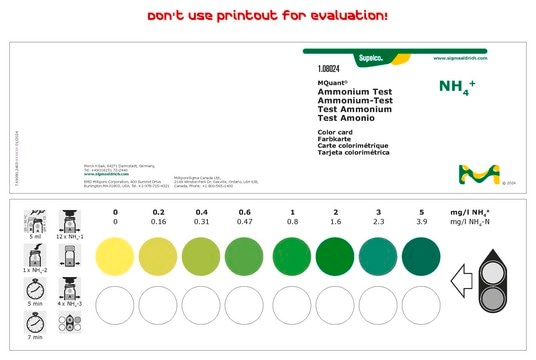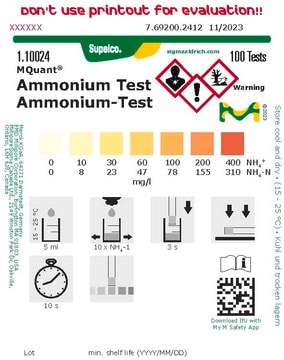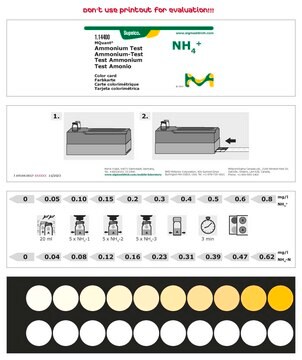MAK310
Ammonia Assay Kit
sufficient for 200 fluorometric tests
Synonym(s):
Ammonia Quantitative Test Kit
Sign Into View Organizational & Contract Pricing
All Photos(1)
About This Item
UNSPSC Code:
12161503
NACRES:
NA.84
Recommended Products
detection method
fluorometric
relevant disease(s)
genitourinary disorders; gastrointestinal diseases
storage temp.
−20°C
General description
Ammonia (NH3) or the ammonium ion (NH4 +) is found in the atmosphere, rainwater, soil, seawater, and volcanic areas. It is widely used as fertilizer, being an important source of nitrogen for living systems. It also plays a role in animal physiology. Ammonia is produced by amino acid metabolism and is converted to urea in the human liver through the urea cycle. Ammonia acts as a precursor for various other nitrogen compounds. It is a colorless gas with pungent odor and can be easily liquefied. It is also used as a feed supplement in livestock industry.
Features and Benefits
Compatible with high-throughput handling systems.
Suitability
Suitable for the quantitative determination of ammonia/ammonium concentration in biological samples, such as urine, and environmental samples
Principle
The Ammonia Assay Kit provides a simple and high throughput adaptable assay for quantitative determination of ammonia/ammonium ion concentration in biological samples, such as urine, and environmental samples. This assay is based on the o-phthalaldehyde method in which the reagent reacts with ammonia/ammonium ion producing a fluorometric result ( ex = 360/ em = 450 nm), proportional to the ammonia concentration in the sample. The kit has a linear detection range of 0.012–1 mM ammonia in a 96 well format.
Signal Word
Danger
Hazard Statements
Precautionary Statements
Hazard Classifications
Acute Tox. 4 Oral - Aquatic Acute 1 - Aquatic Chronic 1 - Eye Dam. 1 - Skin Corr. 1B - Skin Sens. 1
Storage Class Code
8A - Combustible corrosive hazardous materials
Flash Point(F)
188.6 °F
Flash Point(C)
87 °C
Certificates of Analysis (COA)
Search for Certificates of Analysis (COA) by entering the products Lot/Batch Number. Lot and Batch Numbers can be found on a product’s label following the words ‘Lot’ or ‘Batch’.
Already Own This Product?
Find documentation for the products that you have recently purchased in the Document Library.
Customers Also Viewed
Hazardous materials chemistry for emergency responders, 553-553 (2013)
Daphné Coache et al.
PloS one, 17(6), e0270206-e0270206 (2022-06-25)
This study assessed the stability of six extemporaneously compounded hydroxyurea oral liquids stored at room temperature. Hydroxyurea oral liquids (100 mg/mL) were prepared using three different mixing methods (mortar, mixer or QuartetRx) from either bulk powder, capsule content, or whole
Umarah Mubeen et al.
The Plant cell, 30(10), 2240-2254 (2018-09-20)
The Target of Rapamycin (TOR) kinase is a central regulator of growth and metabolism in all eukaryotic organisms, including animals, fungi, and plants. Even though the inputs and outputs of TOR signaling are well characterized for animals and fungi, our
Beatriz Vallejo et al.
Microbial cell factories, 19(1), 124-124 (2020-06-09)
Saccharomyces cerevisiae wine strains can develop stuck or sluggish fermentations when nutrients are scarce or suboptimal. Nutrient sensing and signaling pathways, such as PKA, TORC1 and Snf1, work coordinately to adapt growth and metabolism to the amount and balance of
Adam Armada-Moreira et al.
Advanced biosystems, 4(10), e2000139-e2000139 (2020-09-02)
Excitotoxicity is a cellular phenomenon that comprises the consequences of toxic actions of excitatory neurotransmitters, such as glutamate. This process is usually related to overproduction of reactive oxygen species (ROS) and ammonia (NH4+ ) toxicity. Platinum nanoparticle (Pt-NP)-based microreactors able
Our team of scientists has experience in all areas of research including Life Science, Material Science, Chemical Synthesis, Chromatography, Analytical and many others.
Contact Technical Service












